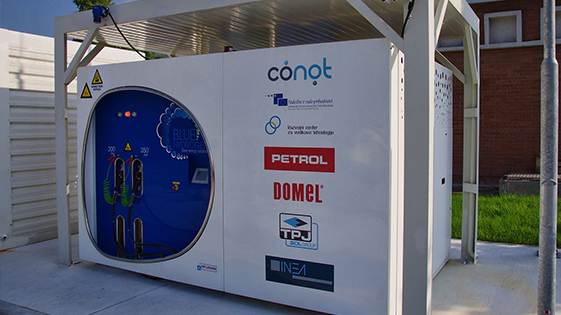Hydrogen as motor fuel
Hydrogen is an increasingly important alternative source of energy in road transport, produced from renewable sources and featuring low emissions. Petrol is the first in Slovenia to supply it.
CONTACT US REFERENCESIn Europe, passenger cars still produce as much as 12% of all carbon dioxide emissions, with transport vehicles producing an additional 20%. Consequently, we are seeing an accelerated development of technology to allow for zero emissions in transport (so-called "ultra low emission vehicles" or ULEV).
In this, hydrogen fuel cell technology plays and extremely important part. In line with the transposed European directive, Slovenia has committed itself to providing an adequate number of publicly available hydrogen charging points by 31 December 2025, both for local transport and for cross-border transport.
At Petrol, we have already equipped the Lesce petrol station with the first compressed hydrogen filling point in Slovenia. We continue to develop our own network of filling infrastructure for alternative propellants, with a vision of comprehensive management and transition to a low-carbon society.
Production from renewable sources
A green, highly efficient fleet
Hydrogen-powered passenger vehicles are nowadays offered by almost all leading car manufacturers. Hyundai and Toyota have already produced the second generation of FCEV or "Fuel Cell Vehicles", with other leading European manufacturers such as BMW AG and Mercedez Benz announcing their own plans to develop the technology. A wider range of hydrogen-powered vehicles is expected in 2020.
Fuel cells convert the chemical energy of hydrogen into electricity, which ensures high power utilization. In fuel cells, this is currently between 65 and 70%, almost 100% higher than conventional engines with internal combustion. Vehicle ranges are also better than in traditional vehicles.
*Estimated promotional price, with an energy value of 33.3 kWh / kg in the liquid phaseUse in urban passenger transport
The use of hydrogen technologies is also of great importance for larger cities. As even a small number of filling points will be enough to supply urban transport, hydrogen used as fuel can ensure the reduction of greenhouse gas emissions and dust particles even in areas with a high population density. Thus, as part of EU projects FlyFLEET:CUTE, ECTOS and CHIC, several practical demonstrations of the use of buses powered by hydrogen have already taken place in many European cities.
Cities are encouraged to consider hydrogen-powered public transport in their integrated transport strategies, as well as consider placing filling stations in their municipal spatial plans.

